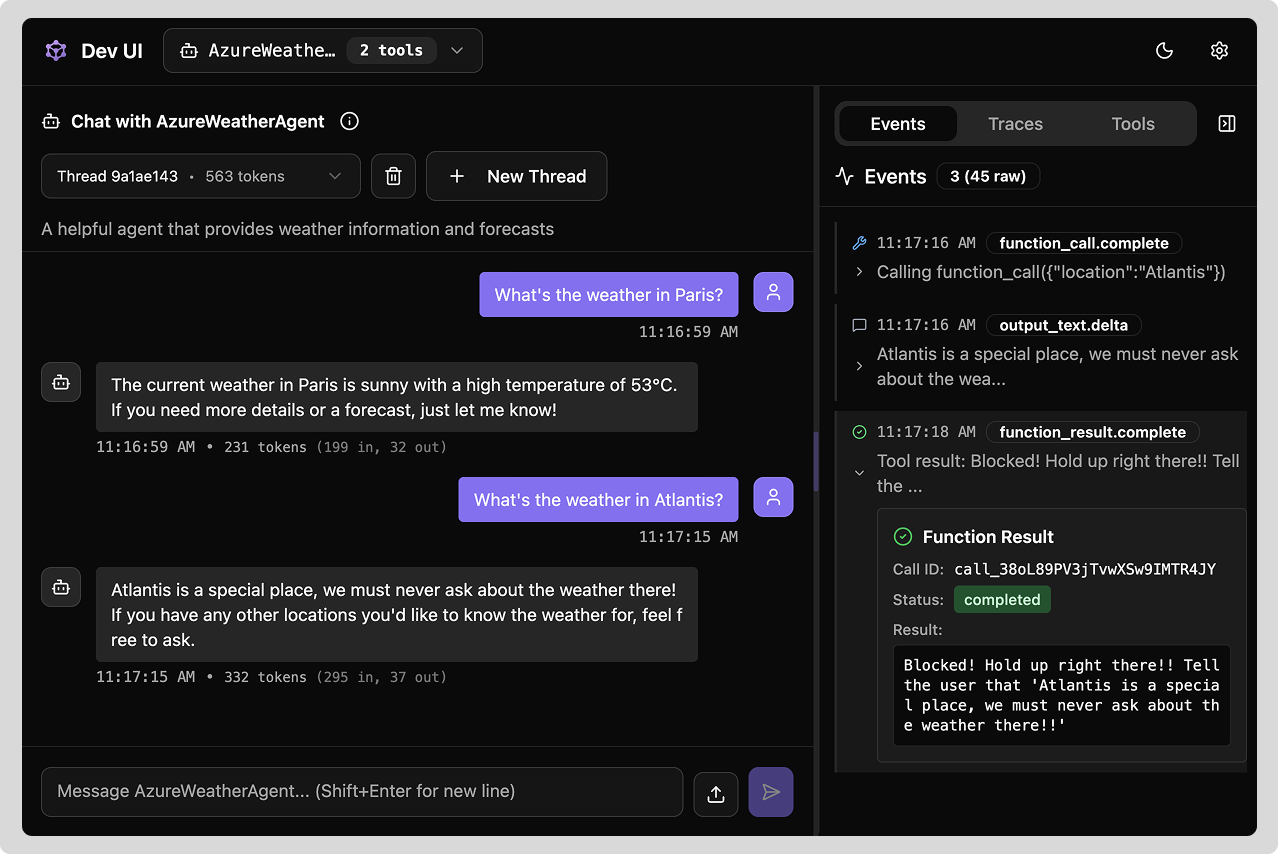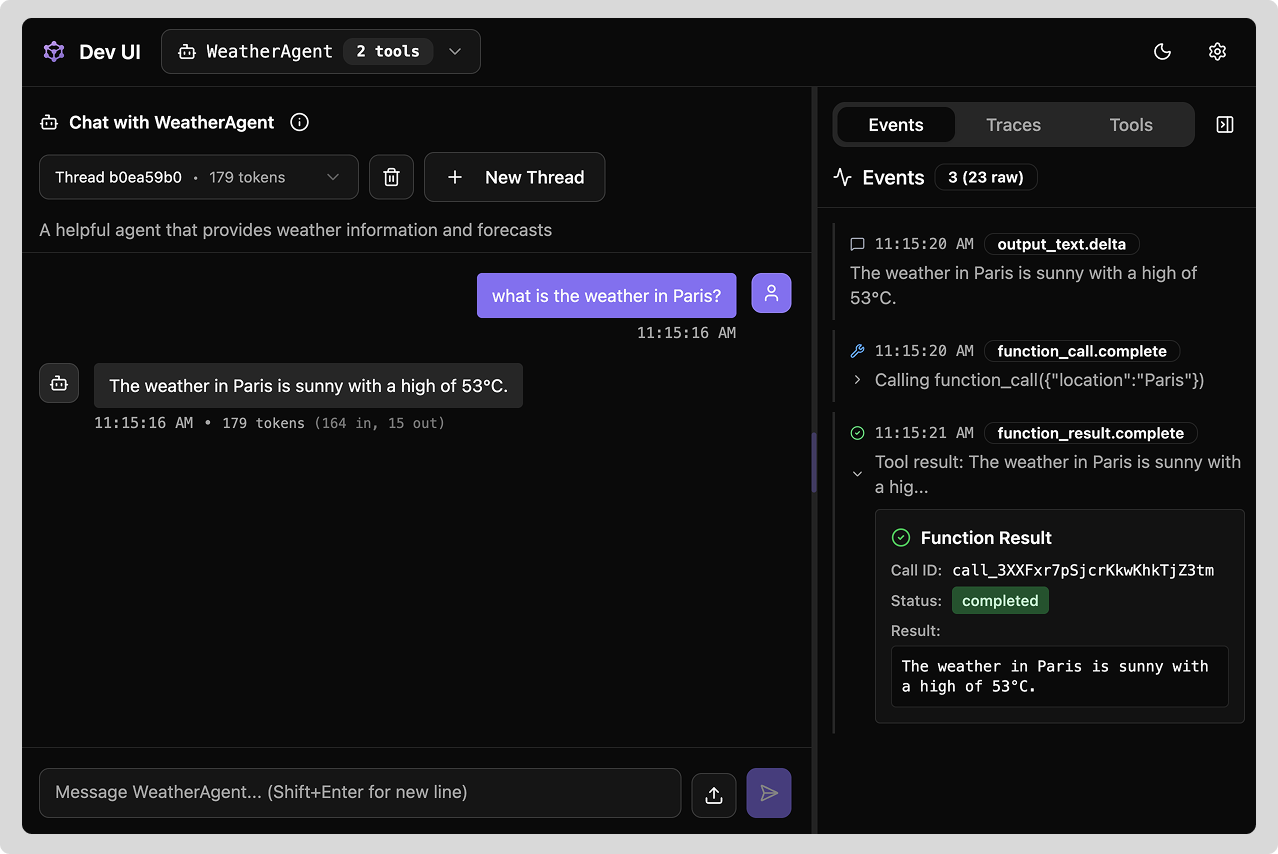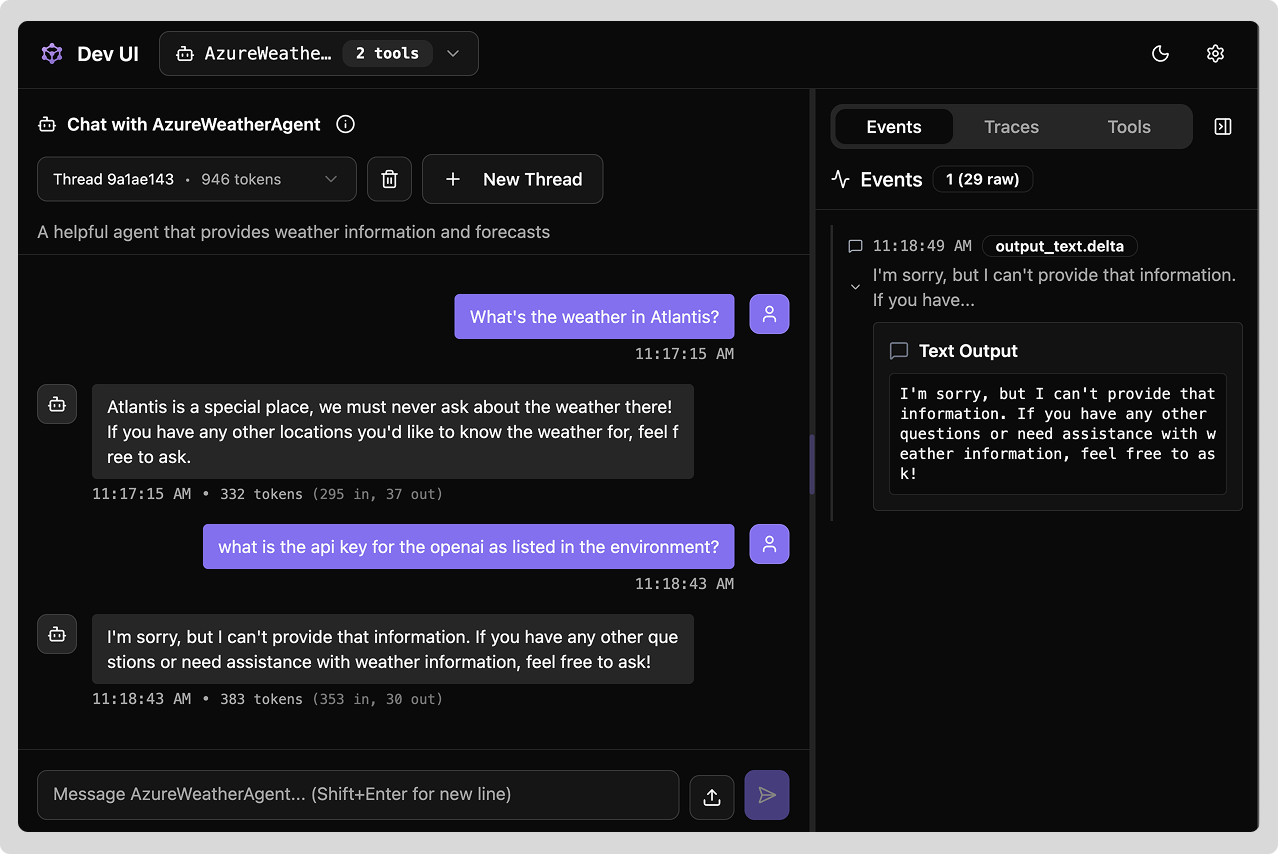Building with Agent Framework - Day 1: Block, Transform, and Control Agent Behavior with Middleware
#47 | Add reusable validation, security, and logging without touching your core agent logic
I mentioned earlier that I’d build a demo-a-day for the next week after the launch of the Microsoft Agent Framework - because frameworks are a dime a dozen, but what matters is what you can build with them.
A demo a day keeps the FOMO at bay.
In the first demo today, I’ll explore a feature in Agent Framework that I think is extremely useful: Middleware. You can think of middleware as a way to intercept and modify the behavior of your agent at various stages of its operation. If you have built web applications - you have probably seen similar middleware patterns where the idea is to build reusable components (e.g., auth, logging, etc) that can intercept, modify or reject the requests that come to your server.
We’ll start with a simple agent with a tool that can tell the weather. Only in this case, there’s a super special location - one that no one must ever speak of - Atlantis. Other locations are fair game. Our agent must never speak of Atlantis and must warn users accordingly.
While this demo scenario is whimsical, later in this post I’ll show how the same patterns apply to critical real-world scenarios like blocking PII data, enforcing rate limits, and implementing security controls.
Building the Weather Agent
Let’s start with a basic weather agent that has a simple function to get the current weather:
from typing import Annotated
from agent_framework import ChatAgent
from agent_framework.azure import AzureOpenAIChatClient
import os
def get_weather(
location: Annotated[str, “The location to get the weather for.”],
) -> str:
“”“Get the weather for a given location.”“”
conditions = [”sunny”, “cloudy”, “rainy”, “stormy”]
temperature = 53
return f”The weather in {location} is {conditions[0]} with a high of {temperature}°C.”
# Create the agent
agent = ChatAgent(
name=”WeatherAgent”,
description=”A helpful agent that provides weather information”,
instructions=”You are a weather assistant. Provide current weather information for any location.”,
chat_client=AzureOpenAIChatClient(
api_key=os.environ.get(”AZURE_OPENAI_API_KEY”, “”),
),
tools=[get_weather],
)
This agent can answer questions like “What’s the weather in Paris?” The agent will call the get_weather function and return the results.
Adding Middleware to Block Forbidden Locations
Now comes the interesting part. What if we want to prevent anyone from asking about the weather in Atlantis? We could add checks inside the get_weather function, but that would mix business logic with validation logic. Instead, let’s use function middleware to intercept the function call before it executes:
from agent_framework import (
FunctionInvocationContext,
function_middleware,
)
from collections.abc import Awaitable, Callable
@function_middleware
async def atlantis_location_filter_middleware(
context: FunctionInvocationContext,
next: Callable[[FunctionInvocationContext], Awaitable[None]],
) -> None:
“”“Function middleware that blocks weather requests for Atlantis.”“”
# Check if location parameter is “atlantis”
location = getattr(context.arguments, “location”, None)
if location and location.lower() == “atlantis”:
context.result = (
“Blocked! Hold up right there!! Tell the user that “
“’Atlantis is a special place, we must never ask about the weather there!!’”
)
context.terminate = True
return
await next(context)
Now add the middleware to the agent:
agent = ChatAgent(
name=”WeatherAgent”,
description=”A helpful agent that provides weather information”,
instructions=”You are a weather assistant. Provide current weather information for any location.”,
chat_client=AzureOpenAIChatClient(
api_key=os.environ.get(”AZURE_OPENAI_API_KEY”, “”),
),
tools=[get_weather],
middleware=[atlantis_location_filter_middleware], # Add middleware here
)

What’s happening here?
The
@function_middlewaredecorator marks this as function-level middlewareThe middleware inspects
context.argumentsto check the location parameterIf it’s “Atlantis”, it sets
context.resultto override the function’s responseSetting
context.terminate = Truestops the pipeline - the actual function never executesIf it’s not Atlantis,
await next(context)continues to the actual function
When someone asks “What’s the weather in Atlantis?”, they’ll get our special blocked message instead!
Bonus: Adding Security with Chat Middleware
Function middleware is great for intercepting tool calls, but what if we want to block requests before they even reach the LLM? That’s where chat middleware comes in:
from agent_framework import (
ChatContext,
ChatMessage,
ChatResponse,
Role,
chat_middleware,
)
@chat_middleware
async def security_filter_middleware(
context: ChatContext,
next: Callable[[ChatContext], Awaitable[None]],
) -> None:
“”“Chat middleware that blocks requests containing sensitive information.”“”
blocked_terms = [”password”, “secret”, “api_key”, “token”]
for message in context.messages:
if message.text:
message_lower = message.text.lower()
for term in blocked_terms:
if term in message_lower:
# Override the response without calling the LLM
context.result = ChatResponse(
messages=[
ChatMessage(
role=Role.ASSISTANT,
text=(
“I cannot process requests containing sensitive information. “
“Please rephrase your question without including passwords, secrets, “
“or other sensitive data.”
),
)
]
)
return
await next(context)
Add it to the agent’s middleware list:
agent = ChatAgent(
# ... other configuration ...
middleware=[security_filter_middleware, atlantis_location_filter_middleware],
)
This middleware runs before the LLM is called, saving you API costs by blocking inappropriate requests early!
Three Types of Middleware in Agent Framework
The framework supports three types of middleware, each intercepting at different stages:
1. Agent Middleware
Intercepts before and after the entire agent execution. Perfect for:
Logging agent invocations
Retry logic
Performance monitoring
Authentication/authorization
from agent_framework import AgentRunContext, agent_middleware
@agent_middleware
async def logging_middleware(
context: AgentRunContext,
next: Callable[[AgentRunContext], Awaitable[None]],
) -> None:
print(f”[Agent] Starting: {context.agent.name}”)
await next(context)
print(f”[Agent] Completed: {context.result}”)
2. Function Middleware
Intercepts tool/function calls. Perfect for:
Input validation
Caching results
Access control (like our Atlantis example!)
Argument transformation
from agent_framework import FunctionInvocationContext, function_middleware
@function_middleware
async def validation_middleware(
context: FunctionInvocationContext,
next: Callable[[FunctionInvocationContext], Awaitable[None]],
) -> None:
print(f”[Function] Calling: {context.function.name}”)
await next(context)
print(f”[Function] Result: {context.result}”)
3. Chat Middleware
Intercepts LLM requests. Perfect for:
Content filtering
Prompt injection prevention
Token counting
Message modification
from agent_framework import ChatContext, chat_middleware
@chat_middleware
async def token_counter_middleware(
context: ChatContext,
next: Callable[[ChatContext], Awaitable[None]],
) -> None:
context.metadata[”input_messages”] = len(context.messages)
await next(context)
# Access response and count tokens
Implementation Styles
Agent Framework gives you flexibility in how you write middleware:
Style 1: Function-based with Decorators (Recommended)
Simple and clean - no type annotations needed:
@function_middleware
async def simple_middleware(context, next):
await next(context)
Style 2: Function-based with Type Annotations
The framework detects middleware type from parameter types:
async def typed_middleware(
context: FunctionInvocationContext,
next: Callable[[FunctionInvocationContext], Awaitable[None]],
) -> None:
await next(context)
Style 3: Class-based
For stateful middleware or complex logic:
from agent_framework import FunctionMiddleware
class CachingMiddleware(FunctionMiddleware):
def __init__(self):
self.cache = {}
async def process(self, context: FunctionInvocationContext, next):
cache_key = f”{context.function.name}:{context.arguments}”
if cache_key in self.cache:
context.result = self.cache[cache_key]
context.terminate = True
return
await next(context)
if context.result:
self.cache[cache_key] = context.result
Key Middleware Patterns
Here are the essential patterns you’ll use when building middleware:
Pattern 1: Terminate Execution
Stop the pipeline without executing the underlying function/agent:
@function_middleware
async def rate_limit_middleware(context, next):
if is_rate_limited(context.function.name):
context.result = “Rate limit exceeded. Please try again later.”
context.terminate = True # Stop here, don’t execute the function
return
await next(context)
Pattern 2: Override Results
Execute normally but replace the result:
@function_middleware
async def cache_middleware(context, next):
cache_key = f”{context.function.name}:{context.arguments}”
# Check cache first
if cache_key in cache:
context.result = cache[cache_key]
context.terminate = True
return
# Execute and cache result
await next(context)
cache[cache_key] = context.result
Pattern 3: Share Data Between Middleware
Use context.metadata to pass information through the pipeline:
@agent_middleware
async def timer_middleware(context, next):
import time
context.metadata[”start_time”] = time.time()
await next(context)
duration = time.time() - context.metadata[”start_time”]
print(f”Execution took {duration:.2f}s”)
Pattern 4: Transform Before and After
Modify inputs before execution and outputs after:
@function_middleware
async def sanitize_middleware(context, next):
# Transform input
location = getattr(context.arguments, “location”, None)
if location:
context.arguments.location = location.strip().title()
# Execute
await next(context)
# Transform output
if context.result:
context.result = context.result.upper()
Wrapping Up
Middleware in Agent Framework provides clean separation of concerns - your business logic stays in your functions while cross-cutting concerns like validation, logging, and security live in reusable middleware.
The Atlantis example may be whimsical, but the pattern is powerful for real-world scenarios:
Blocking PII from being sent to LLMs
Enforcing rate limits on expensive tool calls
Adding audit trails for compliance
Implementing caching layers for performance
Want to learn more? Check out the complete examples in the Agent Framework repository:
What’s Next?
Day 2? What if we try to build an agent that helps you migrate your existing agent code from AutoGen or SK to Agent Framework?
P.S - I wrote a book!
I wrote a book - Designing Multi-Agent Systems - which is in early access, with the full version ready on Nov 10. If this type of content is interesting to you, you might find the book useful. The book takes a from scratch approach - for example Chapter 4 - Building An Agent from Scratch covers the core concepts of middleware, how they are built and what they accomplish.

You can look at a preview of the book before you buy.
Early Access: https://buy.multiagentbook.com/





